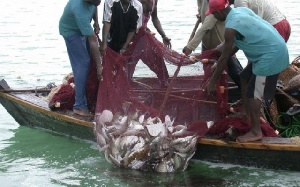GhanaWeb Feature by Ernestina Serwaa Asante
Aquaculture provides nearly half of the world’s fish supply, a figure that continues to grow as wild fish stocks diminish due to overfishing and environmental changes.
In Ghana, the domestic supply for fishes falls short of the demand, which leads to the importation of this essential commodity to supplement the shortfall.
Then importation also puts a strain on the country’s foreign exchange reserves.
In 2022, Ghana’s fish requirement stood at 1.31 million metric tonnes, while domestic production was only 657,000 tonnes. A total of 650,000 tonnes of fish was imported at a tune of US$311 million.
Due to this, the Minister of Fisheries and Aquaculture, Mavis Hawa Koomson, in July every year announces a ban on fishing to allow fish populations to recover and ensure sustainable fishing practices for the future.
Halting the fishing activities temporarily also helps reduce fishing pressure and promote a healthy marine ecosystem.
The ban on fishing during this period is called Closed Season or biological rest period.
Why it is important for fishermen to observe closed season
Research has shown that observing closed season allows for the reproduction and replenishment of the fish population. This helps the fish stocks to remain healthy in the ecosystem.
However, some fisherfolk face challenges including financial constraints during this period. Because there is no catching and selling of fishes during the closed season, some fisherfolk who do 'hand-to-mouth' are left in the dark as there is no money to fend for both themselves and their families.
The fishmongers, on the other hand, are also affected because there are no fishes to be processed and sold to customers.
Some of these fishermen and fishmongers resort to the mending of nets to make an ends meet, however, the monies generated are mostly nothing to write home about.
Addressing the challenges
To address the challenges raised above, President Nana Addo Dankwa Akufo-Addo in July 2024 launched the Fisheries and Aquaculture for Food and Jobs project.
The initiative, geared towards sustainable development, food security, and job creation is expected to produce 20,000 metric tonnes of fish per annum.
It is also expected to create over 60,000 direct and indirect jobs for persons within the sector.
The Fisheries and Aquaculture for Food and Jobs project aims at providing alternative employment opportunities for fishermen and persons living within the coastal areas during the closed season.
Conclusion
The Aquaculture for Food and Jobs Programme boosts local fish production which helps in the reduction of dependence on imports.
It also ensures the availability of fresh, domestically-produced fish on the market.
Fishermen, after the closed season usually make a bumper catch. Apart from the abundance of fish, the good weather conditions also contribute to the weighing down of their nets once they cast them into the sea.
Business News of Wednesday, 7 August 2024
Source: www.ghanaweb.com













